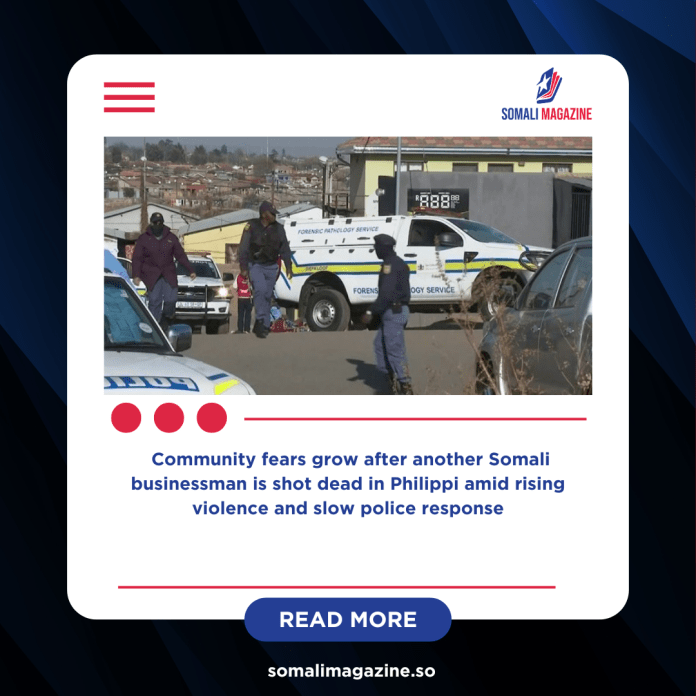Facebook Twitter (X) Instagram Somali Magazine - People's Magazine
South African bandits shot and killed a Somali businessman, Mahmoud Abdi Osman, in the Philippi area of Cape Town on Friday night. According to community members, Osman was attacked inside his small shop by armed men who entered suddenly and opened fire. He died at the scene before any help could arrive. Residents say the incident has once again highlighted the growing danger faced by Somali traders working in South Africa, especially in neighborhoods like Philippi that have become known for frequent crime and repeated attacks on foreign-owned shops.
Philippi, located on the outskirts of Cape Town, is considered one of the most unsafe places for Somali business owners. Many Somalis run convenience shops, electronics stalls, and small retail businesses in the area because it is one of the few places where migrants can afford to rent space. But over the years, these shops have regularly been targeted by criminals who see them as vulnerable. Local Somali traders say attacks often happen late in the evening, and most victims are caught off-guard before they have a chance to protect themselves or call for help.
People familiar with Friday night’s shooting said the armed attackers escaped quickly, leaving the community shocked and angry. Police arrived hours later, gathered statements, and confirmed an investigation is underway. However, no arrests have been made so far, and authorities did not share additional information about the possible motive or identity of the attackers. Many Somali residents in Philippi say delays in police response are common and contribute to the growing feeling of insecurity.
The Somali community in South Africa has been voicing concerns for years about the dangers they face. Business owners often complain that they are targeted not only for robbery, but also because criminals assume they keep cash in their shops. Some victims have previously reported being threatened, beaten, or forced to hand over goods. In many cases, attackers escape without consequences, leaving families to deal with the emotional and financial losses on their own.
In recent weeks, incidents involving Somali-owned shops have sharply increased. Community leaders say there have been multiple attacks, several injuries, and now another tragic death. They warn that if the trend continues, more families will lose loved ones and more businesses will close. For Somali traders who rely on these small shops to support their families both in South Africa and back home, the situation has become extremely worrying.
Despite the rising violence, the Somali government has not yet released a statement addressing the repeated killings and robberies targeting its citizens in South Africa. Many in the diaspora community feel frustrated by the silence, saying the lack of official response leaves them feeling forgotten. They hope that a stronger diplomatic effort could pressure South African authorities to improve security and protect migrant communities more effectively.
South African authorities themselves have faced criticism for what many perceive as slow or inadequate action. Somali business owners say police rarely patrol the areas where most attacks happen, and investigations often move slowly. Although officials occasionally promise improvements, residents say they have seen little change on the ground. Many believe that stronger policing, better community engagement, and faster response times could help prevent similar tragedies.
Every year, a significant number of Somalis living in South Africa experience deadly attacks, injuries, and theft. Some eventually choose to leave the country because they no longer feel safe. Others stay because they have no alternative source of income, even though they live in constant fear. The Somali community in Cape Town is now calling for urgent measures to protect migrant traders, prevent further violence, and hold attackers accountable. They hope that the death of Mahmoud Abdi Osman will not be just another statistic, but a wake-up call for authorities to take concrete steps to safeguard vulnerable communities.

